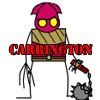busman
Level 6 Magician
   Playing OD&D, once again. Since 2008!
Playing OD&D, once again. Since 2008!
Posts: 448
|
Post by busman on Jan 21, 2012 1:02:04 GMT -6
Why all the love for this newly invented interpretation that has you reroll all your hit dice every time you achieve a new level? That's obviously not what was intended. I don't care if you like the idea and use it, I just don't understand the appeal. Because it's not a new interpretation, it comes from the days when these rules were written, in 1974. As for what was obviously intended, I don't think you can say that with such vehemence, OD&D is fairly mute on the subject, actually. I think an interpretation from OEPT is a very reasonable place to pull from. Because it solves several issues as discussed in this very thread, and others on this board: 1) It tends to ensure over time that characters are maintain HP closer to the intended average expected. 2) It solves sticky situations with level progression between pips and new HD. 3) It alleviates players who roll terribly from suffering forever. 4) It makes losing levels easier to deal with Because in short, it reduces bookkeeping. Less bookkeeping is a wonderful thing. That's what makes it so attractive. |
|
|
|
Post by llenlleawg on Jan 21, 2012 11:29:37 GMT -6
As a bit of outside but relevant evidence of the pedigree of this method, the original edition of Chivalry & Sorcery also handled Fatigue points this way (and, while C&S had fatigue and body, fatigue was the score that went up with new dice every level; body just added one or two points). Since C&S was self-admittedly intended as a revision of D&D that became its own game, it suggests that, in those first years, not a few people rerolled hit points every level (keeping the old total if rolling lower).
As far as the numerical impact goes, a few years ago on another forum I was drawn into a statistical debate on just this point. The long and short of it is that this method more or less guarantees no low hit points after a few levels (certainly by mid-level) and, while the uppermost hit points are statistically no more common than in the roll the new die only method, overall (i.e. in a population of characters), there will be a *slightly* higher average (by, say, one or two points at 10 hit dice). Also, one oddity is that, but the time the wizard has 10 hit dice, he will be statistically more likely to have slightly more hp than a fighting man with 10 hit dice (again, a few points at most). Does this really matter? Not in my book, but my interlocutor was hot and bothered by it!
|
|


